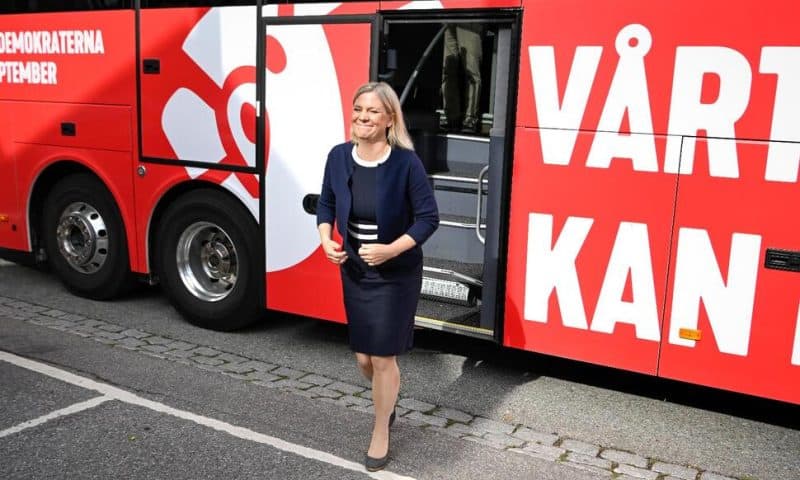Swedish Prime Minister Magdalena Andersson is on the campaign trail a week before the national election.
NORRTALJE, Sweden — Prime Minister Magdalena Andersson on Sunday was on the campaign trail a week before Sweden’s national election to tackle fears over gang violence and rising electricity bills.
Andersson traveled by bus to communities near Stockholm to try to reassure voters. The election on Sept. 11 comes amid a sense of rising insecurity, with a spate of shootings in Sweden making crime a key campaign issue.
Russia’s war against Ukraine led Sweden, along with Finland, to take the historic step of applying to join NATO. That step has reassured many, and is so uncontested it hasn’t been an issue in the campaign before the election.
But Andersson said that Russia’s energy “warfare” against Europe, including a cutoff of gas through the Nord Stream 1 pipeline to Germany, has become an issue that voters keep raising with her as she campaigns for her left-wing Swedish Democratic party.
“Many people are concerned with their electricity bills given Putin’s warfare on energy,” the 55-year-old leader said in comments to The Associated Press after a visit at a senior community center in Norrtalje, a town to the north of Stockholm.
“I mean he has a military invasion in Ukraine, but he also has energy warfare against Europe, so people are very concerned with electricity bills but also with criminality and climate.”
Her government pledged Saturday to provide $23 billion in liquidity guarantees to electricity companies, a step that followed the cutoff to Nord Stream 1, and was meant to prevent a financial crisis.
Another concern for Andersson is the rising popularity of a populist far-right party with its historical roots in the Nazi movement, the Sweden Democrats.
The party, which has worked to mainstream its image, is closer to power than it has ever been, causing many Swedish voters to fear that it could end up with a key position of power in a right-wing coalition. The anti-migrant party has gained in popularity as the country has struggled to integrate large numbers of migrants. Critics fear its roots in the extreme far right make it a threat to the county’s democratic foundations.
Polls show that a right-wing coalition including the Sweden Democrats has a chance at winning power, though the race is expected to be close.
Andersson told the AP she is concerned, noting that an employee of the right-wing party sent out an email last week inviting people to celebrate the Nazi invasion of Poland 83 years ago.
“That kind of invitation would never happen in any other parties in Sweden. Having said that, many of the voters of the Sweden Democratic party, they are decent people that are disappointed with the development,” she said.
Against the backdrop of shootings and the challenge from the right, the Social Democrats have been toughening up their stance in recent years. In this campaign, the party has been promising tougher measures to fight crime along with promises to preserve the Scandinavian country’s famous welfare protections.
Andersson and her party said she believes the problems can be tackled together, and that the welfare system is one of the best weapons for fighting crime.
Andersson told the AP that her solution to crime involves building up the police force and putting more of the criminals behind bars, while also tackling the social roots of the problem.
“We also have to work harder to prevent new generations from choosing a criminal life. And I think the only way to do that is to stop the segregation that we have in Sweden,” she said.
Andersson traveled in a large red bus emblazoned with the words “our Sweden can do better.” After leaving the senior center, she headed to a fair on park grounds in Botkyrka where party campaigners wore T-shirts saying “I vote for Magdalena” and where families from multicultural immigrant backgrounds lined up for pony rides and other attractions.
Andersson is Sweden’s first-ever female prime minister. She took job last November after her predecessor, Stefan Lofven, resigned after leading the party and country since 2014.
While she has to fight the perception that her party hasn’t managed to stem the gang violence ailing the country. In her favor is a reputation for being a steady and competent hand who has governed with a thin majority and through a time of geopolitical upheaval.
At the party fair, Annelie Gustafsson, a 45-year-old mother carrying her daughter on her shoulders, wouldn’t say who she was voting for. But she made clear her vote was meant to keep the Sweden Democrats out of power. She opposes their unwelcoming stance to migrants, which Gustafsson feels undermines the country’s tradition of being a humanitarian refuge.
“This year it was about which party I don’t want to see running the country, and that’s really important for me,” she said. “I’m proud of being Swedish, I’m proud of the people here, and that we help other people. … So closing the country, that’s not for me.”

